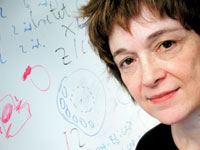
The woman who helped explain our sense of smell woke up Oct. 4 to the sweet smell of success as UW alumna Linda Buck, '75, a scientist at the Fred Hutchinson Cancer Research Center, shared the 2004 Nobel Prize in physiology or medicine with Richard Axel of Columbia University.
Buck and Axel's work is a landmark achievement in the study of the nervous system. It is the first to define one of our sensory systems in the most detailed manner possible-by outlining the genes and proteins that allow the brain to identify 10,000 different odors.
A Seattle native, Buck, 57, majored in psychology and microbiology as a UW undergraduate. She is an affiliate professor of physiology and biophysics at the University as well as a member of the Fred Hutchinson research team. She is also an investigator for the Howard Hughes Medical Institute. With this honor the UW now has nine Nobel Prize laureates: five faculty and four alumni.

"I am overjoyed and quite surprised to receive this honor," Buck said at an Oct. 4 press conference. She is only the 11th woman to receive a Nobel Prize in science since the awards were founded in 1901.
The basic principles of how we recognize and remember about 10,000 different odors have long been a mystery. In a series of pioneering studies as a postdoctoral fellow with Axel, Buck clarified how our olfactory system works. She discovered a large gene family, made up of some 1,000 different genes that give rise to an equivalent number of olfactory receptors. These receptors are in cells that occupy a small area in the upper part of the lining of the nose and detect the inhaled molecules.
But how does the brain detect 10,000 different odors with only 1,000 different receptors? Buck likened the process to forming words with letters of the alphabet. "Just as you put different combinations of letters of the alphabet together to form words, you put different combinations of receptors together to get different smells," she said.
The scientist won her award for basic research, but said there could be some practical applications that might arise out of her work. Once the mechanics of smell are completely understood, it might be possible to restore a sense of smell to those who have lost it due to illness.
Basic behaviors, such as fear or appetite, can be triggered by smells and Buck said her research may help decode the mechanisms behind these emotions. In a 2003 interview, she said tracking smell signals in the brain could identify the neural circuits that control instinctive behaviors and emotional responses. "We hope to be able to identify the neurons that control those behaviors. Perhaps we can then identify molecules on those neurons that can be used as drug targets to treat emotional and behavioral disorders in humans," she explained.
Buck grew up in north Seattle. Her father was an electrical engineer who often tried to get his three daughters interested in tinkering with motors. Her mother was a homemaker who was obsessed with puzzles-particularly crossword puzzles. Buck says she may have inherited some of her scientific drive from both parents. "My mother used to complain that I wouldn't give up on anything. She said that I had a one-track mind," Buck says.
After graduating from Roosevelt High School in 1965, Buck came to the UW but it took her 10 years to get a dual degree in microbiology and psychology, partially because she took some time off for travel. "I wasn't sure what I wanted to do. I was filled with angst; I wanted to do something to help other people, but I didn't want to do an M.D. Then I discovered immunology and I never looked back," she says.
She studied with Psychology Professors Walter Markaus and Steve Woods and worked as an undergraduate research assistant in Markaus's vision lab. That project resulted in one of her first published scientific papers.
Asked if she struggled as a woman in a male-dominated field, Buck replied, "I didn't feel there were any barriers for women. There might have been but I didn't see them." After graduating from the UW, Buck earned her Ph.D. from the University of Texas Southwestern Medical Center in Dallas. She then did post-doctoral work with Axel at Columbia where the two made their Nobel Prize-winning discoveries. Buck was a professor at Harvard Medical School before joining "the Hutch" in 2002.
Other UW alumni who have won Nobel Prizes are George Stigler, '31, who won the 1982 prize in economics; George Hitchings, '27, '28, who shared the 1988 prize in medicine; and Martin Rodbell, '54, who shared the 1994 prize in medicine. Visit Linda Buck's web site at http://www.fhcrc.org/visitor/nobel/buck/